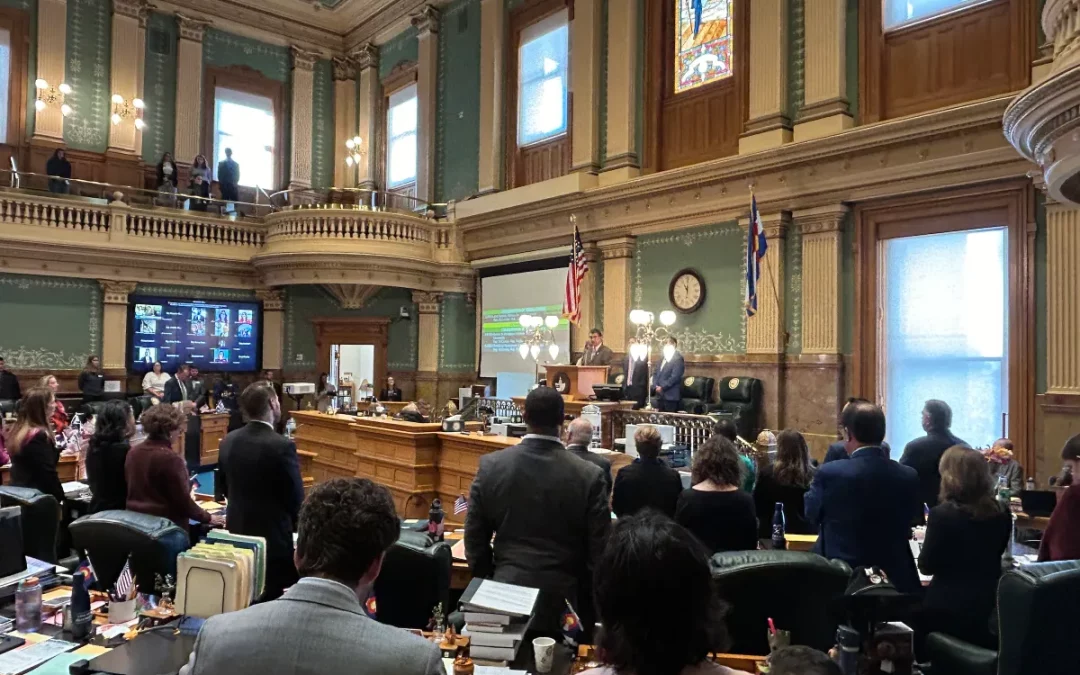Colorado lawmakers say they want Congress to do its job and fund repairs to a deteriorating irrigation system in southwestern Colorado.
The irrigation system, called the Pine River Indian Irrigation Project, is one of 16 federal projects in the West that have fallen into disrepair. The maintenance backlog is extensive and would cost more than $2.3 billion to address. State legislators passed a resolution Friday calling on Congress to fully fund one key pot of money.
“It’s just a letter to Congress to go do your job,” said Sen. Cleave Simpson, a Republican from Alamosa.

The federally managed Pine River Indian Irrigation Project includes about 175 miles of earthen ditches, metal headgates and concrete diversion structures. About 400 water users, including about 100 non-Native farmers and ranchers, rely on water from the system to support their agricultural businesses. Residents in the nearby town of Ignacio use its water for their lawns and gardens.
Parts of the project have collapsed and been abandoned. Ditches have eroded to the point that water can’t reach diversion points. Multiple large, antiquated flumes — like the Butzbaugh Flume, a pipe raised on concrete stilts that carries water over farmland — are in danger of failing. At the wrong time of year, an upstream break could cut off water to hundreds of acres of farmland.
Estimates to repair the Pine River project have ranged from $20 million to $109 million.
“This system is a federal project, and we have been absorbing the costs associated with maintenance for the benefit of these farmers and ranchers for decades,” Southern Ute Chairman Melvin Baker told state legislators during the annual Ute Day address at the Capitol on Friday.
“Water is critical to our way of life”
In 2016, Congress passed the Water Infrastructure Improvements for the Nation Act, which directed the Secretary of the Treasury to deposit $35 million each year into the Indian Irrigation Fund.
But since 2018, Congress has spent $10 million annually, less than a third of the allowed amount, from the fund to address maintenance issues.
“The United States has failed to live up to its responsibility to adequately fund and maintain the Pine River Indian Irrigation Project,” U.S. Sen. Michael Bennet wrote in a prepared statement in January. “This project is a priority of mine and I will continue to work with the Southern Ute Indian Tribe to fully fund this critical infrastructure.”
Bennet did not respond to requests for comment or for clarification about why Congress spent less than it could have to address the maintenance backlog. Neither did U.S. Rep. Lauren Boebert, whose district includes southwestern Colorado.

The Southern Ute Indian Tribe and the Bureau of Indian Affairs disagree over what type of responsibility the bureau has regarding the Pine River project — another factor complicating efforts to fix the maintenance backlog.
The Indian irrigation projects receive funding from other sources, like dues paid by irrigators and funding buckets attached to the $1 trillion infrastructure legislation that passed in 2021.
Southern Ute representatives focused on the Indian Irrigation Fund during Colorado River Drought Task Force meetings in 2023.
The task force, a group of water experts assembled by the state legislature to make water policy recommendations, suggested the state legislature send a letter to Congress as one of its top recommendations for the 2024 session.
Four state legislators, including Simpson, put forward a resolution calling on Congress to meet the maximum allocations for the $35 million fund.
“A memorial like this from the Colorado General Assembly has to carry some weight,” Simpson said. “I’ve never been on the other end of them, so I don’t know, but I would hope it would raise it to a level of, ‘All right, we need to pay more attention.’”
Legislators adopted the resolution during Ute Day at the legislature, when representatives from several Ute tribes visited the state Capitol and advocated for tribes’ health care, economic and environmental priorities.
“Water is critical to our way of life,” Baker, the Southern Ute chairman, told the General Assembly before thanking several legislators for their responsiveness in securing funding for the irrigation project. “We are protecting the water for our current needs, and we’re protecting water for future generations.”


 Print
Print